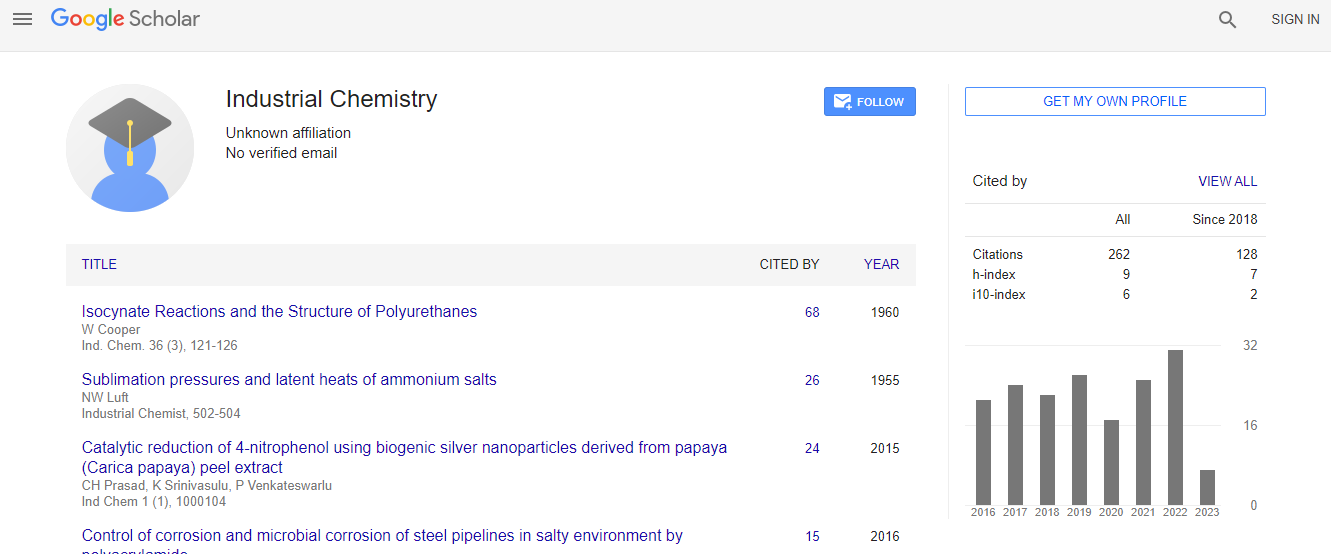Our Group organises 3000+ Global Conferenceseries Events every year across USA, Europe & Asia with support from 1000 more scientific Societies and Publishes 700+ Open Access Journals which contains over 50000 eminent personalities, reputed scientists as editorial board members.
Open Access Journals gaining more Readers and Citations
700 Journals and 15,000,000 Readers Each Journal is getting 25,000+ Readers
Google Scholar citation report
Citations : 262
Industrial Chemistry received 262 citations as per Google Scholar report
Indexed In
- Index Copernicus
- Google Scholar
- RefSeek
- Directory of Research Journal Indexing (DRJI)
- Hamdard University
- EBSCO A-Z
- OCLC- WorldCat
- Scholarsteer
- Geneva Foundation for Medical Education and Research
- Euro Pub
Useful Links
Recommended Journals
Related Subjects
Share This Page
Effects of magnetic treated water on rats and cows hemogasometry
17th International Conference on Industrial Chemistry and Water Treatment
Geraldo Balieiro Neto
Sao Paulo State Government of Agriculture and Food Supply, Brazil
Keynote: Ind Chem
Abstract
The goal of this study was to evaluate the effect of magnetic water on blood gas level of rats and cows. Twenty six jersey cows and forty-eight wistar rats were divided into two groups: control (cows=13, rats=24), drinking regular water and the group test, drinking magnetic water-treated (cows=13, rats=24). A completely randomized design was used. Blood samples were collected from caudal auricular artery in cows and from femoral artery in rats. The water treatment was performed using a commercial magnetic conditioner (Sylocimol) designed to generate a strong magnetic monopole field of 3,860 Gauss. These devices were inserted into the water troughs. No significant difference was found in the water intake between the groups. The SO2 (91.75% vs 94.60%) was higher and levels of CHCO3 (28.66 vs 25.04mmHg) and pCO2 (53.85 vs 46.40mmHg) showed unusual reductions with the same pH and anion gap in the arterial blood of the rats drinking the magnetic water-treated and there was no difference in blood pH (7.32 vs 7.31), because of the systemic acid-base balance. On the other hand no significant difference was found on CHCO3 (26.17 vs 25.87mmHg) and SO2 (98.4% vs 98.3%) however higher pH (7.44 vs 7.40, p<0.05) and lower pCO2 (37.97 vs 42.47mmHg, p<0.05) were found in arterial blood of cows drinking magnetic-treated water compared to control group. These effects were attributed due reduced metabolism in kidney to bicarbonate buffer production. The consumption of water treated by magnetic field provided an effective way to decreased metabolic acidosis.Biography
Geraldo Balieiro Neto has completed his PhD from São Paulo State University and Post-doctoral studies from University of Evora. He is a Scientific Researcher in full dedication to research (40h) and a Research Director from São Paulo State Government, in Department of Agriculture and Food Supply, São Paulo Agency for Agribusiness Technology (APTA), since Jun 13, 2005. He has published more than 27 papers in reputed journals and has been serving as an Editorial Board Member of repute.
Email:geraldobalieiro@apta.sp.gov.br

 Spanish
Spanish  Chinese
Chinese  Russian
Russian  German
German  French
French  Japanese
Japanese  Portuguese
Portuguese  Hindi
Hindi 